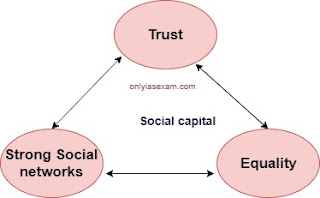For increasing the productivity of individual and group, the following capitals are needed:
Traditionally, importance was only given to physical capital ( i.e tools and machines) and human capital ( i.e. education). Nowadays, importance is also given to social capital.
Let us understand social capital with examples, Let us say Mr. Ramesh's mother is admitted to the hospital and 10 bottles of blood are needed for surgery urgently. Ramesh is new in the city and he does have any friends in this city. He called his friend ( Mr. Shyam) who is living in another city. Mr. Shyam has a strong network of friends circles and he has many friends in that city. Mr. Shyam called his ten friends & each has donated a bottle of blood for Ramesh's mother. Mr. Shyam is able to arrange the blood for Ramesh's mother because of social bonding and trust.
This bonding & trust between peoples is called social capital.
A population to be considered as a social capital if it has the following characteristics:
It has been proved by research that higher social capital & cohesion leads to the good health condition of individuals & groups. Lower trust among citizens increases the mortality rate.
Education sectors benefits:
A budget alone does not help increase the schooling of the population. Social capital, or, Bonding between peoples & group network helps people to access:
Social capital provides helping hands to needy people. The good linkage between peoples fulfill the needs of each other, it has been seen that many people do crime for fulfilling the basic things. Helping the hands of people can prevent crime & violence.
- Physical capital
- Human capital
- Social capital
Traditionally, importance was only given to physical capital ( i.e tools and machines) and human capital ( i.e. education). Nowadays, importance is also given to social capital.
What is social capital?
Social capital is the durable mutual bonding of the network of relationships among people who live and work as a family.Let us understand social capital with examples, Let us say Mr. Ramesh's mother is admitted to the hospital and 10 bottles of blood are needed for surgery urgently. Ramesh is new in the city and he does have any friends in this city. He called his friend ( Mr. Shyam) who is living in another city. Mr. Shyam has a strong network of friends circles and he has many friends in that city. Mr. Shyam called his ten friends & each has donated a bottle of blood for Ramesh's mother. Mr. Shyam is able to arrange the blood for Ramesh's mother because of social bonding and trust.
This bonding & trust between peoples is called social capital.
 |
| The population as social capital |
A population to be considered as a social capital if it has the following characteristics:
- Trust: social trust, honesty, tolerance, solidarity
- Equality: political equality, high moral standards & human values
- The social network of durable bonding: strong social-based
Negative consequences :
These characters could make the population economically productive and empowered.
Social capital may have negative consequences in the following way:
- Without bridging between groups, groups can become isolated from the rest of society.
- Bonding of certain individuals for common radical ideas can create a lot of problems, such as ethnic marginalization, and ethnic cleansing.
- This leads to political polarization if the country has weak political institutions.
Social Capital benefits:
In maintaining the good population health:It has been proved by research that higher social capital & cohesion leads to the good health condition of individuals & groups. Lower trust among citizens increases the mortality rate.
Education sectors benefits:
A budget alone does not help increase the schooling of the population. Social capital, or, Bonding between peoples & group network helps people to access:
- Schooling & education.
- Prevent Child workforce
- Knowledge Share & knowledge base
Social capital provides helping hands to needy people. The good linkage between peoples fulfill the needs of each other, it has been seen that many people do crime for fulfilling the basic things. Helping the hands of people can prevent crime & violence.
ConversionConversion EmoticonEmoticon